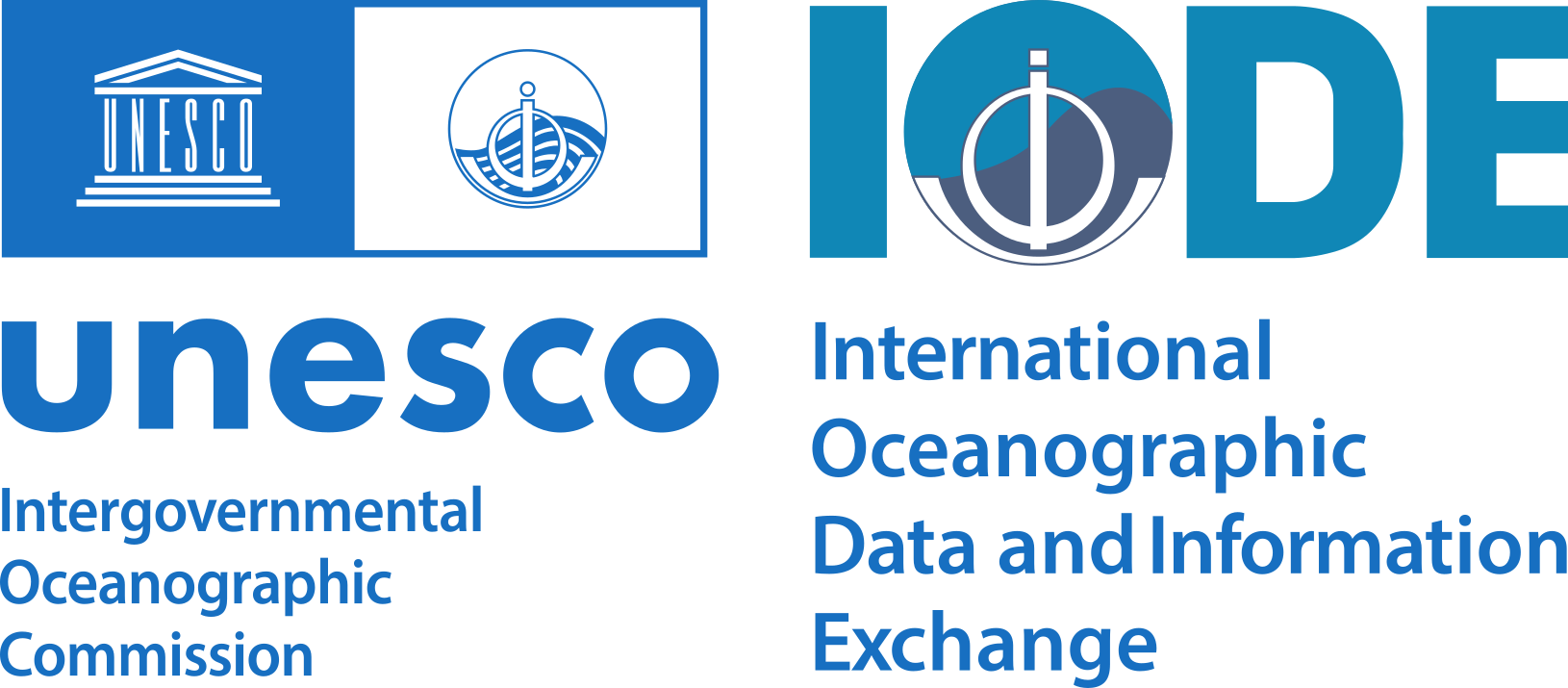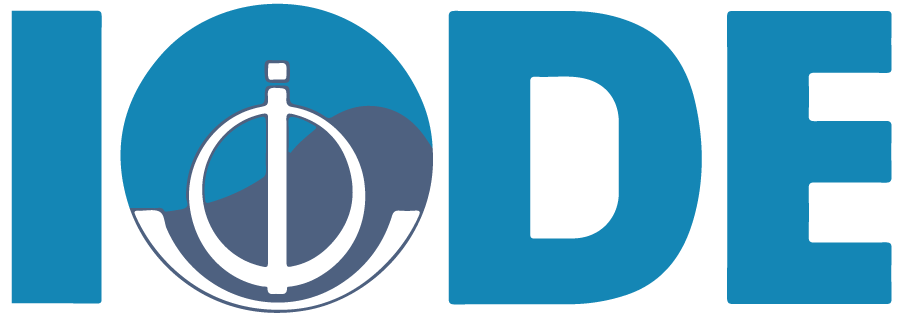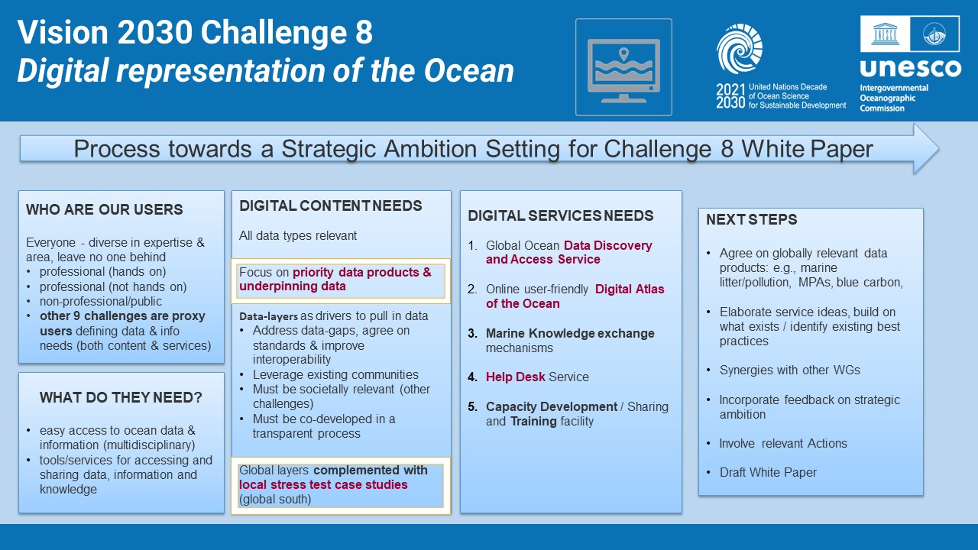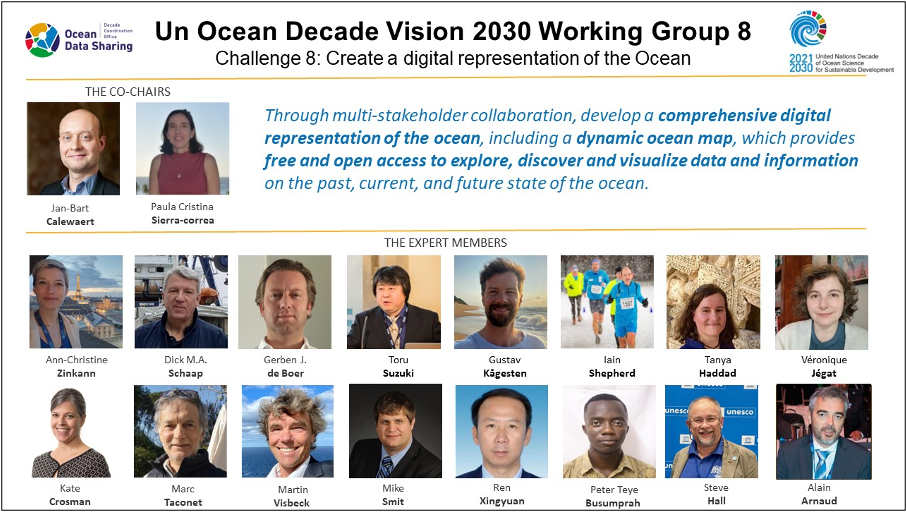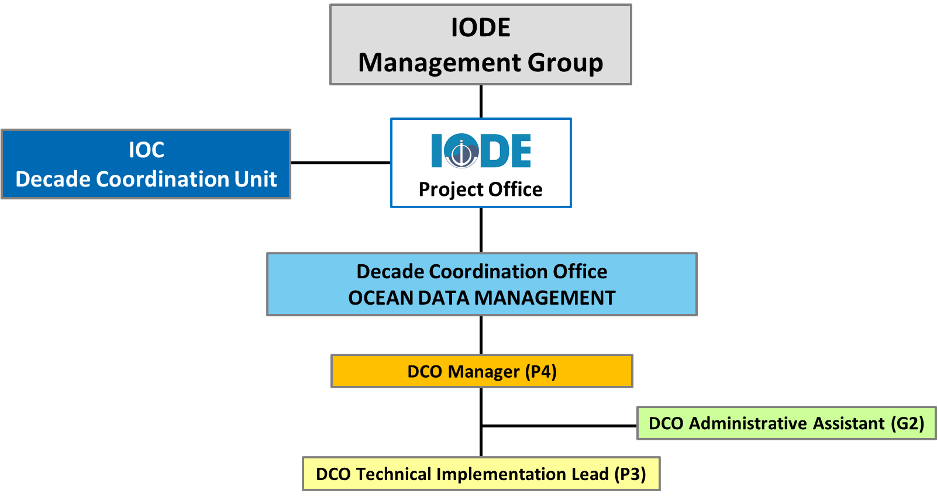While the data and information shared through the IODE ocean data and information centres of the IODE network are of great use to the ocean research community they are of equal or even more use to stakeholders further up the value chain from ocean observation/research to decision support and policy making. In order to achieve the mission of the UN Decade of Ocean Science for Sustainable Development (Transformative ocean science solutions for sustainable development, connecting people and our ocean), open and equitable access to data, information and technology and innovation (Challenge 8) will be essential. IODE’s ocean data and information services provide services to a growing number of IOC and Decade activities:
Contributions of IODE to the UN decade of Ocean Science for Sustainable Development
The United Nations has proclaimed a Decade of Ocean Science for Sustainable Development (2021-2030) (see http://www.oceandecade.org) to support efforts to reverse the cycle of decline in ocean health and gather ocean stakeholders worldwide behind a common framework that will ensure ocean science can fully support countries in creating improved conditions for sustainable development of the Ocean. As mandated by the UN General Assembly, the Intergovernmental Oceanographic Commission (IOC) of UNESCO will coordinate the Decade’s preparatory process, inviting the global ocean community to plan for the next ten years in ocean science and technology to deliver, together, the ocean we need for the future we want! The International Oceanographic Data and Information Exchange (IODE) programme of the IOC is the programme responsible for enhancing marine research, exploitation and development, by facilitating the exchange of oceanographic data and information between participating Member States, and by meeting the needs of users for data and information products. The IOC Assembly, at its 30th Session (June 2019) recognize that a major component of the ocean data and information system landscape is not linked to the IOC and the need to collaborate with those communities/systems in order to achieve improved accessibility, unrestricted use and interoperability of data and information. In addition the Assembly recalled that the IOC decided that IODE will work with existing stakeholders, linked and not linked to the IOC, to improve the accessibility and interoperability of existing data and information, and to contribute to the development of a global ocean data and information system, to be referred to as the IOC Ocean Data and Information System, leveraging established solutions where possible, including existing IODE systems and others. One of the key targets of the UN decade is “Promoting knowledge and information that are more equitably shared around the world (closing the knowledge gaps amongst countries, balancing the knowledge systems and taking into consideration the needs of coastal communities and more particularly the most vulnerable such as the Small Island Developing States and Least Developed Countries)“. [content to be added from Implementation Plan 2.3]
2019
As from 2019 the IODE programme has started te development of its contribution to the UN decade. A first initiative was the development of the ODISCat: an online browsable and searchable catalogue of existing ocean related web-based sources/systems of data and information as well as products and services. It will also provide information on products and visualize the landscape (entities and their connections) of ocean data and information sources. (see: http://catalogue.odis.org).
2020
The second initiative was the organization of the “Workshop on data sharing between UN agencies as a contribution to the UN decade of ocean science for sustainable development” (online meeting, 20 April 2020). Its purpose was to bring together member organisations of the UN-Oceans group (http://www.unoceans.org). The meeting was attended by FAO, IOC, ISA, UNDP, UNEP, UN ESCAP, UFCCC, UN Statistics, WCMC and WMO. The participants shared information on the ocean related data and information held or coordinated by their organization. To ADD 2021- 2022? To be checked [no text]
2023
IODE hosts the Decade Coordination Office (DCO) for Ocean Data Sharing
Decade Coordination Office (DCO) for Ocean Data Sharing
The Decade Coordination Office (DCO) for Ocean Data Sharing (ODS) was launched on the 1st of June 2023 by Jan-Bart Calewaert and Oonagh McMeel as part of the Intergovernmental Oceanographic Commission (IOC) of UNESCO’s efforts under the UN Decade of Ocean Science for Sustainable Development. As of February 2025, leadership has transitioned to Dr. Adam Leadbetter, the new Lead Manager, marking the start of the new operational phase of the DCO-ODS.
Hosted by IODE, the Decade Coordination Office for Ocean Data Sharing acts as sub-unit of the central Decade Coordination Unit to catalyse and coordinate Decade Actions falling under its scope, assist decade actors with data and information challenges and opportunities, promote cooperation amongst UN and Member State partners, monitor progress, communicate on achievements and mobilise resources.
The Decade Coordination Office for Ocean Data Sharing is made possible through the generous support of the ENGIE Foundation.
What is a DCO?
Within the context of the UN decade of Ocean Science for Sustainable Development a “Decade Coordination Office” acts as sub-unit of the central Decade Coordination Unit. Catalysis and coordination of Decade Actions including of Calls for Decade Actions, organise and coordinate Decade review processes, promote cooperation amongst UN and Member State partners, communications, monitoring, and resource mobilisation. DCOs are typically established and hosted by UN agencies.
IODE and the DCO for Ocean Data sharing
Within the context of the UN decade of Ocean Science for Sustainable Development a “Decade Coordination Office” acts as sub-unit of the central Decade Coordination Unit. Catalysis and coordination of Decade Actions including of Calls for Decade Actions, organise and coordinate Decade review processes, promote cooperation amongst UN and Member State partners, communications, monitoring, and resource mobilisation. DCOs are typically established and hosted by UN agencies.
